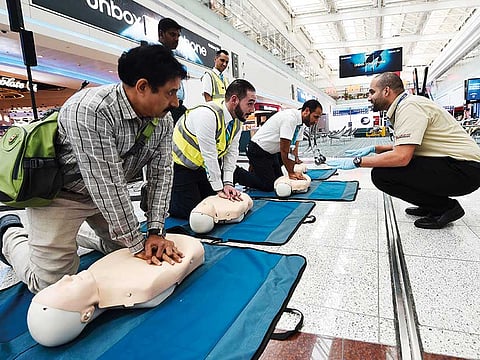Do you have a first aid box in your home and car?
World First Aid Day is here, and it’s a good time to take stock

Also In This Package
Dubai: Do you keep a first aid box handy at home? And are you trained in first aid? If not, this is as good a time as any to get yourself a first aid kit and consider some basic lessons.
As the UAE marks World First Aid Day, which falls on the second Saturday of September every year, doctors at Dubai’s trauma hub said around 30-40 per cent of the cases received at Rashid Hospital’s Trauma and Emergency Centre are first aid-related.
“First aid is an important tool to quickly respond to accidents and ensure that injuries are quickly dealt with by the time the trained medical professional arrives to administer more specialised treatment. First Aid can be a life saver as it can prevent further complications in minor or severe injuries,” said Dr. Firas AlNajjar, Consultant at Rashid Hospital’s Trauma and Emergency Centre.
First aid training is provided in the UAE by different institutions, with DHA having the biggest pool of instructors in the UAE to teach such courses.
What does first aid cover?
First aid teaches you how to clear the patient’s airway if he is not breathing properly, If there’s bleeding, take a gauze from the first aid kit and put pressure on the wound; if bleeding continues despite putting pressure, go to the hospital.
The Four Bs’ that must be addressed in an emergency are the patient’s breathing, bleeding, burns and bones.
If there is a burn, apply cool tap water; if the patient has fallen and hit himself; bring him into a correct position. All these important steps are taught in first-aid courses.
What should a first aid kit contain?
*Keep at least one first-aid kit in your home and one in your car. *Store your kits someplace easy to get to and out of the reach of young children. Basic supplies • Box: First aid home kit • Sterile gauze • Small Band-Aid • Sterile wound solution • Pair of gloves • Small scissors • Adhesive plaster
Dr AlNajjar added that first aid could specially be effective when it comes to minor injuries such as sport, household and work-related injuries if administered correctly and early.
First rule
He added that the first and most important rule in first aid is to ensure the safety of the first aid provider, so that the administrator does not become a second victim and to not compromise the safety of the person in need of help.
However, when it comes to more severe cases like heart attacks, drowning etc. Dr AlNajjar stressed that the person administering first aid must first call an ambulance and then begin first-aid until the ambulance arrives. “If they have not gotten the needed training on this, they can speak to ambulance officials on the phone for step-to-step guidance. It is not advisable for a person who does not have any training to administer first-aid without consulting a health care professional, as this can have adverse effects,” said Dr AlNajjar.
Sign up for the Daily Briefing
Get the latest news and updates straight to your inbox









